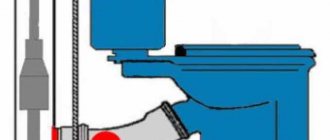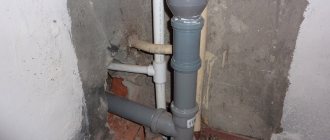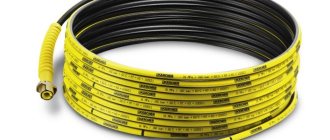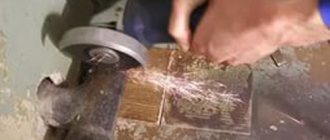Legislation
- The Civil Code of the Russian Federation regulates relations in the field of rights and contractual obligations, including on the part of public utilities.
- The Housing Code of the Russian Federation establishes criteria for the quality of housing and communal services.
- Federal Law of December 7, 2011 No. 416-FZ “On Water Supply and Water Disposal”, Article 21, establishes the grounds for limiting and stopping water disposal.
- Decree of the Government of the Russian Federation dated May 6, 2011 No. 354 “On the provision of utility services to owners and users of residential premises in houses” contains criteria for the quality of sanitation, payment procedures, and recalculation practices. Clause 122 prescribes what utilities must take into account when shutting off sewers. Chapter 11 reveals the mechanism for limiting and disabling a resource.
Types of locking systems
Water drainage is limited using a variety of systems, the most popular of which are:
- Whale;
- Octopus;
- Terminator Pro.
Sprut system
The simplest and most common Sprut system consists of the following elements:
- probe;
- blocking plug;
- video cameras;
- manipulator.
Locking system "Sprut"
The advantages of this system are:
- presence of a durable metal plug;
- possibility of preliminary verification using a video camera;
- the possibility of complete or partial blocking of drainage;
- no violations of the system’s tightness, which could lead to inconvenience for other residents of the house.
Blocking using the Sprut system is done by lowering the probe through the ventilation riser on the roof of the building. An error may occur while performing the procedure.
Features of the “Kit” system
The more accurate, but also more expensive “Kit” system is additionally equipped with LED lamps, which eliminate the possibility of errors when searching for the desired section of the sewer system, and a remote control, which facilitates the process of installing the plug.
Sewer blocking system "Kit"
The advantages of the system are:
- high strength of the plug, which almost completely eliminates the possibility of independent dismantling of the equipment;
- possibility of remote installation;
- light weight.
The “Kit” system, its advantages and installation rules are described in the video.
System "Terminator Pro"
The Terminator Pro sewer blocking system is also popular with utility services. The system consists of the following elements:
- a probe equipped with a video camera;
- control panel;
- coils;
- anti-vandal strut.
Blocking system for sewer network Terminator
The advantages of this type are:
- ease of movement;
- possibility of remote control;
- possibility of installing three types of plugs (polymer, armored and elastic).
Unlike other systems, “Terminator” allows you to install plugs at a depth of up to 100 m, which corresponds to a building of 33 floors.
Is it legal to turn off sewerage?
Utilities have every right to limit or suspend water disposal for certain legal reasons:
- an emergency or natural disaster in the networks providing the service. Disabling occurs from the moment a threat or event occurs;
- identification of the fact of illegal unauthorized connection to communications;
- obtaining a corresponding order from a government authority;
- maintenance by the consumer of communications inside the apartment in poor condition, which threatens the full drainage of the entire apartment building;
- discharge of substances prohibited by law.
For these reasons, sewer lines may be cut off without warning.
Dear readers!
To solve your problem right now, get a free consultation
- contact the on-duty lawyer in the online chat on the right or call: +7 (499) 938 6124 - Moscow and region.
+7 (812) 425 6761 — St. Petersburg and region. 8 (800) 350 8362 - Other regions of the Russian Federation You will not need to waste your time and nerves
- an experienced lawyer will solve all your problems!
IMPORTANT! Shutting down is possible for 8 hours per month in total or for 4 hours at a time in case of an emergency.
The grounds on which disconnection is legal if a certain order is observed are separately stated:
- There is a debt on utility bills.
- Repairs of water supply lines are planned. The service will be terminated 10 days after notification.
In addition, public utilities, when undertaking such a serious procedure, must ensure:
- security of common property;
- maintaining services from bona fide payers;
- compliance with sanitary standards.
If these conditions are not met, then it is prohibited to restrict the sewerage.
Warning
When a decision is made to turn off water supply to a consumer for non-payment, the management company is obliged to warn about this in advance. Thus, the debtor is given the opportunity to pay off the RSO.
IMPORTANT! The debtor must be notified properly.
The notice is handed to the owner personally against signature by employees of the service organization or sent by registered mail with notification by mail. If the case goes to court, it is necessary to confirm that the debtor knew about the upcoming disconnection and did nothing to resolve the conflict peacefully.
The warning specifies the period within which the debt must be paid - 20 days.
Any other option for informing residents about upcoming sanctions is also allowed - in the next receipt, by phone, using the personal account of the State Services portal, by email.
After 20 days, a restriction is introduced, and after another 10 days, the service is completely disconnected.
What should be the debt?
In order for the management company to have the right to cut off the sewer system, the consumer must accumulate a debt equal to two monthly standard payments.
Moreover, regardless of the presence of flow meters. If, due to objective circumstances or temporary difficulties, the owner could not pay the rent, but does not deny the debt and is ready to repay it, he can enter into an installment payment agreement. To do this, you need to contact the Criminal Code, where you write an application and, together with a lawyer, draw up a repayment schedule.
Who should not be turned off
There are categories of citizens who have the right to receive subsidies for utility bills, but do not have the right to use without paying :
- When the earnings of everyone registered in the apartment are below the subsistence level. After a certain procedure, citizens will be recognized as low-income and can receive a subsidy from the state.
- The owner is officially employed, but the employer has not paid wages for a long time. This must be confirmed with a certificate.
- A minor or a disabled person lives in the living space.
Methods of influencing debtors
If the pressure in the heating system drops: procedure
Subparagraph “a” of paragraph 122 of the previously mentioned Resolution provides for the establishment of a ban:
- For damage to common property;
- Violation of the rights of other consumers using apartments in the same building and fulfilling their obligations to pay for the service in full. In other words, sewerage shutdowns for non-payment are carried out only for the defaulter;
- Violation of the suitability of premises for living, which are established by sanitary requirements.
For your information. Unsuitable living conditions include lack of heating and cold water supply. It is prohibited to disable these services in any case.
Options for suspending the provision of services
Any resident of an apartment building uses the services provided for in the contract:
- electricity supply;
- central heating system;
- gas supply;
- hot water supply:
- cold water;
- sewerage.
The power supply is usually turned off at the distribution panel, which is located on the landing. However, for a person who has skills in handling electrical equipment, restoring the functionality of electrical wiring will not be difficult, although it will be illegal. No one will guard the connection point around the clock.
Gas stoves are successfully replaced by electric stoves and electric kettles. In addition, to access the gas tap you need to get into the apartment. This cannot be done without a court decision or the voluntary consent of the owner.
Getting the minimum amount of hot water for water procedures is not a difficult task.
From the above list, the most effective, and with the advent of special blocking devices, a simple way of influencing debtors, can be considered blocking the sewerage system for debtors.
Sewer blocking methods
With the emergence of demand for equipment, manufacturers developed and began production of devices that allow debtors to install plugs in sewer systems. There is more than one example of such equipment on the market.
In multi-storey buildings, the riser of the general building sewer system is located in the attic or technical floor; accordingly, the sewer system is turned off for non-payment of utilities without entering the apartment. Such design solutions for sewerage systems make it possible to block the exit from any apartment entrance located on any floor.
How to install a plug on a sewer
The operating principle of devices that block sewers for debts is simple. A probe is inserted into the pipe through the outlet of the riser in the attic. It is equipped with video surveillance equipment. Gradually lowering the probe into the sewer pipe and visually monitoring the process, they find a way out of the desired apartment.
Together with the surveillance cameras, a sewer blocking device is attached to the end of the probe. Their varieties will be discussed below.
Manufacturers provide different design options for plugs for sewer pipes, as well as installation methods.
The last step is to secure the locking device. The whole process takes from 10 minutes to 1 hour.
The drain plug for debtors can only be removed with a special tool produced by the manufacturer. Unblocking is done within a few minutes.
In what ways do they influence
Management companies have ample opportunities to influence debtors. But they should not go beyond the legal framework. Therefore, they mainly use methods of persuasion and moral influence.
To shame careless residents, it is allowed to post lists of debtors on porches and notice boards. To comply with the law on non-disclosure of personal data, you can not write the full name of the owners, limiting yourself to the apartment number.
It is not allowed to send lists of debtors to the employer with a request to convince the employee of the need to pay the debt. The agreement on utility services between the homeowner and the RSO or management company is of a private law nature. The employer has nothing to do with this, and the disclosure of private facts can be appealed.
Another measure is letters demanding payment of the debt. It also lists the negative consequences and additional costs of litigation.
ADVICE! It is more profitable to peacefully agree on an installment payment than to pay legal costs and pay half the salary under a writ of execution.
How do RSOs deal with debtors?
You have to pay for everything in this life, and utilities are no exception. Back in May 2011, legislators, by Resolution No. 354, introduced rules governing the relationship between consumers and RSOs (resource supply organizations).
According to the norms of the Housing and Civil Codes, suppliers of utility services have the right through the court to collect debts for water, gas, electricity, heat and sewerage. However, this method is not always effective: despite the judge’s decision and the bailiffs visiting the apartment, some defaulters manage to accumulate debts of more than several hundred thousand rubles.
Today, the Rules provide the right to RSO to suspend the supply of utilities if the consumer is in arrears for more than 2 months.
Thus, the suspension of the supply of resources to debtors’ apartments occurs in the following ways:
- the stove is disconnected from the gas pipeline and plugged;
- meters are disconnected from the central power grid;
- water taps are turned off and sealed (except for cold water);
- a plug is inserted into the sewer outlet of the debtor's apartment.
At the same time, the Rules prohibit disconnecting a house from service if at least one tenant pays for utilities. Representatives of the RSO cannot always get into the apartments of debtors either.
Therefore, executors are not always able to disconnect the debtor from the water supply or gas pipeline; there is only one thing left: to shut off the sewerage system.
How to block a sewer
If the debt is not paid within the agreed period, then an employee of the management company will appear to shut off the drainage system. At first glance, it is very simple: you need to install a plug in the sewer system that will not allow waste to pass through. This is difficult to do in an apartment building.
It is important not to infringe on the interests of other residents. Therefore, various shutdown methods have been developed, the principle of operation of which is approximately the same:
- first, the pipeline is inspected with a probe or using a video camera to establish its integrity and absence of leaks;
- then the plumber finds the wiring to the desired apartment;
- lowers the plug with the manipulator;
- installs it.
Such a blockage does not completely block the drains from the apartment, but significantly limits them. This ensures the right of citizens to live in normal sanitary and living conditions, does not threaten neighbors with inconvenience, and at the same time is a sanction for the debtor.
Technical suspension options
Next, you should find out how the sewer system is blocked for non-payment. Currently, a number of devices have been developed for installing plugs on sewers. All of them are created in such a way that the remaining residents of a five-story building or other apartment building do not suffer from such a procedure.
Considering that in houses now the riser is led either to the technical floor or to the attic, there is no need to even go into the debtor’s apartment to install the plug. The operating principle of such devices is very simple. And the procedure itself takes no more than an hour. A special probe is lowered into the riser outlet. Equipment is attached to it, with the help of which you can carry out video surveillance, so that with its help you can find a way out of the desired apartment.
Various methods can be used to disable services.
In addition to the video camera, a special device is attached to the probe, which blocks the sewer pipe. The tenant himself will not be able to remove such a plug without special equipment. This requires specialists. The process of getting rid of the plug takes only a few minutes.
Among the most famous blocking devices (plugs) are the following types:
- System "Sprut". Its equipment can be lowered to a depth of 105 m (about 35 floors).
- The Terminator equipment allows you to monitor the progress of work not only of the performers themselves, but also of the customers. This is possible thanks to the included DVR. This means that it is possible to exclude the option in which the performers report on the work done, but do not put a plug themselves. The presence of a flexible hose in the kit allows you to carry out work even in low attics. Used on pipes from 60 to 150 mm.
- The Sector system refers to reusable equipment. It can be used on pipes with a diameter of 70 to 110 mm. The maximum depth at which this equipment is used is 75 m.
- The “Kit sewer blocking” equipment is distinguished by its low price and the ability to install a plug without using any rotating devices. The maximum working depth is 105 m.
The main feature of the listed plugs is that it is impossible to remove them without the use of special equipment. The plug can be installed by specialists from the Resource Supply Organization (RSO), the Management Company, or simply employees hired from outside.
What to do when the sewer system is turned off due to debts
If there is a debt and the water supply has been turned off, the only way out is to pay it off. When the amount is large and there is no way to repay it in full, they resort to restructuring.
To do this, you need to contact the Criminal Code with a written application addressed to the manager. It should indicate why the debt arose and explain that, as a good citizen and payer, the homeowner undertakes to pay part of the amount monthly until full repayment in addition to the main payment.
It is not profitable for services to get involved in litigation, so such a deal is a win for both parties. If the payment schedule is followed, no sanctions will be applied.
Is it legal to install a cap?
According to the law, the possibility of blocking sewerage is allowed in relation to debtors.
Installing a cap leaves the home habitable.
Attention! The measure of partial or complete blocking of communications calls for paying debt defaulters as quickly as possible, because not having sewerage in an apartment is very inconvenient.
According to the law, it is not allowed to shut off cold water and heating drainage systems in apartments. Also, restrictive measures should not interfere with the full life of the entire home.
Since the plug does not interfere with the fulfillment of these conditions, installation of the device is permitted in accordance with regulatory legal acts.
Preparatory work before installation
Before installing the plug, specialists from the utility organization carry out preparation work:
1. accumulate knowledge about the general operation of the pipeline and its condition.
2. send a notice to the debtor about the suspension of sewer use.
3. study all branches of the common sewer riser.
4.produce an exit from the riser to the pipe without damaging the system.
Attention! A person has 30 days to repay the debt after receiving a notice from the management company.
What happens if you remove the plug without permission?
Removing the plug yourself is prohibited by law, because the use of chemical or mechanical force on the device can damage the entire sewer system.
You can legally remove the plug:
1. if you completely repay the entire debt.
2. if the management company provides an installment plan to pay off the debt.
After completing one of the points within two days, specialists must remove the plug.
In case of failure to perform work by public utilities, you can contact the prosecutor's office that the management company is inactive.
To prevent such situations from arising, you should not accumulate debts for utility bills. When installing a plug, you should not remove it yourself; you must look for a way to solve the problem permitted by law.
Do-it-yourself dismantling of the plug
It is very difficult to dismantle the plug yourself:
1.Professional equipment required.
2.You will also have to remove the toilet to remove the plug.
If it is not possible to go the legal route to remove the plug, then you will have to partially disassemble the riser and disconnect the toilet.
To perform this work, you need to stock up on the following tools:
1.High strength hook.
2.adjustable wrench and wrench.
3.pliers.
4.dowels.
5.hammer and flashlight.
Before you start work, you should carefully weigh all the arguments, because you can damage the common riser. If you are unsure of your abilities and knowledge, it is better not to do this.
How to remove the plug
Before removing the plug, you must remove the toilet; the locking device is located immediately behind it.
Stages of dismantling the plug:
1. turn off the water in the riser.
2.remove the toilet tank and other communication parts.
3.unscrew the bolts of the toilet bowl.
4.remove the bell, at the base of which there is a locking device.
5.Use a rigid hook to remove the plug, hook it, and drag it in your direction.
Sometimes you can remove the lock using pliers. If the plug is made of rubber, then no tools are needed; it is pulled in behind the elastic walls, freeing the sewer hole.
If the plug is made of metal and it is not possible to pick it up, then an inspection is carried out by tapping the pipes to understand its location. A hole is drilled in the pipe and a pin is inserted. Next, tapping with a hammer, the device is advanced.
Important! It is not recommended to carry out this work willfully. You will have to compensate the management organization for the damaged device, and you will still have to pay off the debts. If the riser is damaged, a fine will be imposed.
Remove blocking using a private company
You can remove the blocking by calling specialists from a private organization that has such professional equipment.
If you want to remove the plug without paying off the debt, you can resort to their services.
How to connect back
The legal way to restore sewerage is to pay the debt and notify the management company. A plumber will come to the owner, remove the plug and adjust the functioning of the sewer system.
To do this, you need to send a written application for connection to the sewerage system to the Management Company and attach a copy of the paid receipt. In addition, the former debtor will have to pay for connection.
How long will it take to connect
The current legislation has fixed the period for restoring sewerage operations: 2 days after payment of the debt.
Algorithm for installing the plug
Before installing the limiter, employees of the management company must carefully inspect the place of work to determine whether the work can be carried out and to minimize the occurrence of an accident on the networks. The condition of the pipeline must be satisfactory, the riser must not have branches to other consumers, and the exit to the installation site of the limiter is safe.
If a visual inspection has shown that the work is safe and technically possible, then a specialized team that has undergone preliminary training can begin to take action:
- prepare the required number of plugs according to the number of drains in the apartment;
- from the attic, determine the exit of the drain pipe of the debtor's riser;
- Using a manipulator and an LED, a limiter is installed at the outlet from the apartment.
After installing the plug, the actions of the utility service are activated in duplicate. One act is left to the debtor. The act requires the signatures of responsible housing and communal services employees, sealed with the seal of the enterprise. The debtor's signature is not required.
What will happen to the debtor if he connects himself?
The most harmless sanction for a detected unauthorized connection is insertion of a plug. If the Criminal Code decides to aggravate the matter and calls the police, administrative liability may be imposed. An act on illegal connection to communications will be drawn up and legal proceedings will be initiated.
Judicial practice shows that unscrupulous owners who do not pay rent and illegally use services will still have to pay the debt.
Such cases reach the court in extreme cases, when all methods of peaceful resolution of the dispute have been tried. This means that there is only one possible outcome - collection of debt, legal and other costs in full, as well as consideration of the issue of imposing administrative or other liability.
If, due to an illegal connection, common property or personal property is damaged, these costs will also have to be reimbursed to the culprit.
Dear readers! To solve your problem right now, get a free consultation
— contact the lawyer on duty in the online chat on the right or call: +7 (499) 938 6124 — Moscow and region.
+7 (812) 425 6761 — St. Petersburg and region. 8 (800) 350 8362 - Other regions of the Russian Federation You will not need to waste your time and nerves - an experienced lawyer will solve all your problems! Or describe the situation in the form below:
How to remove the block?
You just need to close the debt, conclude a restructuring agreement, and pay it step by step. Then all receipts will be paid, but the block will not be installed.
The plug can be removed using a variety of mechanical tools. However, do not forget that such actions can lead to flooding of neighbors and your own apartment, which will become another additional problem to the existing ones. It would be good if these actions fall under an article of administrative violation, but there are situations that fall under an article of the Criminal Code.
No one will allow a person to damage common property and utilities. This is already a serious offense for which you will have to bear criminal liability.
The legislation does not oblige a person to pay for the installation of the block and unblocking the drainage system. If a citizen receives an invoice for such work, he can challenge it in court.
Can the sewer system be closed for debt without a court decision?
If you want to find out how to solve your specific problem, please contact the online consultant form on the right → It's fast and free! Or call us by phone (24/7): If you want to find out how to solve your particular problem, call us by phone. It's fast and free! Moscow, Moscow region St. Petersburg, Leningrad region ext. 529 Regions (free call for all regions of Russia) How to deal with debtors? Our people have no conscience. When operating apartments, they use all the services that utility services can provide them. Many, of course, pay, and try to do it regularly, if the amounts in the bills are available, but they never allow a huge debt to appear. Others prefer to believe that they are owed everything, and housing and communal services are completely free for them.










